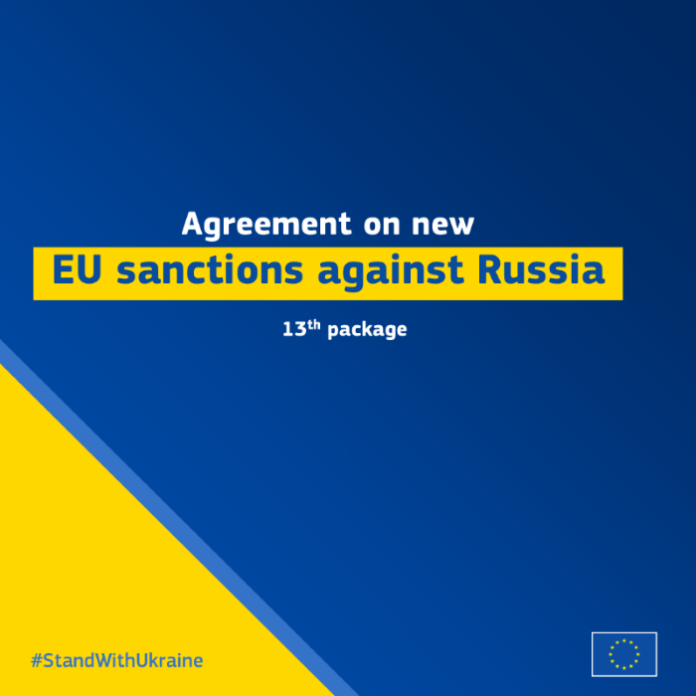The European Union has approved a 13th package of sanctions against Russia, explicitly targeting 193 individuals and entities accused of helping Moscow procure weapons or being involved in the kidnapping of Ukrainian children. The new sanctions also target Chinese and Indian companies accused of supporting Moscow’s war effort. The goal of these sanctions is to “degrade” Moscow’s ability to attack Ukraine.
“‼️ Deal ‼️ EU Ambassadors just agreed in principle on a 13th package of sanctions in the framework of Russia’s aggression against Ukraine. This package is one of the broadest approved by the EU. It will undergo a written procedure and be formally approved for the 24 February,” Belgian Presidency of the Council of the EU 2024 posted on X.
The new package adds 193 entities and individuals to the list of those banned from travelling to the EU or doing business there. However, it doesn’t comprise fresh measures against crucial industrial sectors.
“I welcome the agreement on our 13th sanctions package against Russia. We must keep degrading Putin’s war machine. With 2000 listings in total, we keep the pressure high on the Kremlin. We are also further cutting Russia’s access to drones,” European Commission President Ursula von der Leyen posted on X.
Reports indicate that the new sanctions package targets individuals and entities linked to Russia’s military-industrial complex and those involved in trafficking and kidnapping Ukrainian children.
Despite strict trade restrictions imposed by the West, Russia has managed to produce a large number of weapons, including missiles, drones, and tanks. The EU and its G7 partners are trying to prevent Russia from using third countries and transit routes to bypass existing sanctions aimed at limiting its war economy.
As a consequence, the G7 nations increase their anti-evasion efforts. The sanctions will focus on three Chinese companies, one Indian company, and businesses in Sri Lanka, Turkey, Thailand, Serbia, Kazakhstan, North Korea, and Belarus. These businesses have been identified as suppliers of equipment, particularly electronics and microchips, which Russia uses in the manufacture of weapons and equipment used in the ongoing conflict in Ukraine.
The new measures will also target the procurement network that supports Russia’s military, focusing on the supply chain for drones. In addition, the new package added 27 companies to Annex IV, which means that European firms cannot sell dual-use goods to them.
The EU had initially planned to sanction Chinese companies but dropped the idea due to opposition from member states, particularly Germany.
“We welcome the agreement on the 13th sanctions package against Russia. With 2000 listings in total, we keep the pressure high on the Kremlin. We are also further cutting Russia’s access to drones,” the European Commission announced.
European Union officials are currently in discussions regarding a new set of sanctions as a response to the recent death of Alexei Navalny. The United Kingdom has already imposed sanctions on six prison managers where Navalny was held.
The new package of sanctions is expected to be formally approved in time for the second anniversary of Russia’s invasion of Ukraine on February 24. In addition, the Ambassadors renewed the current sanctions regime, which includes around 2,000 individuals and companies, for a further six months.

